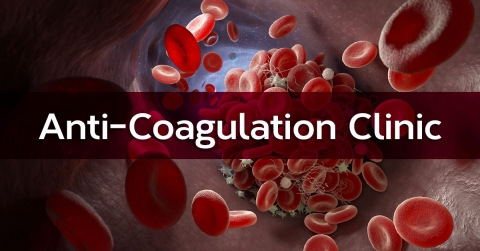Anti-Coagulation Clinic – Monitoring Patients on Blood Thinners

In the treatment of heart valve diseases and rhythm disorders, anticoagulants (also known as blood thinners) are a common part of the process. The OHH Anti-Coagulation Clinic, which includes five different locations, helps monitor patients and ensure their medications are working properly.
In the event of an injury, the body will generally form blood clots to control bleeding. This process is called coagulation. However, the same process that protects us from hemorrhage can also cause complications when a person is living with heart disease.
When the heart is not working properly, the body’s reaction to form blood clots can block blood flow to the heart, lungs, or brain. Blockages to the heart can lead to heart attack, while a blockage of blood to the brain can cause a stroke. To manage these risks of heart disease, patients are often put on medicines called anticoagulants, or blood thinners. These work to keep patients from forming life-threatening clots or to dissolve clots that have already formed. They are often prescribed for patients with AFib, deep vein thrombosis, or prior history of heart attack or stroke.
What are common anticoagulants, and how do they work?
Anticoagulants work by attaching themselves to different factors in the body that cause the blood to clot. Several of them affect a factor called Factor Xa or another called thrombin. When the medication is attached to the factors, clots cannot form properly. Others block the formation of clotting factors.
Common blood thinners include
- apixaban (Eliquis)
- dabigatran (Pradaxa)
- edoxaban (Lixiana)
- rivaroxaban (Xarelto)
- warfarin (Coumadin)
Cautions when using anticoagulants
As with all medications, there are some things to know and risks involved with anticoagulants. With a medication that is designed to prevent clots from forming, the biggest risk is bleeding. Bleeding can happen from cuts, heavy periods, nosebleeds, bleeding gums, or internal bleeding after injury.
When taking anticoagulants, it’s important to be aware of the bleeding risk. Your doctor may recommend avoiding activities with high chances of injury, such as contact sports. If you are injured in an accident or fall, it is important to get checked by a medical professional, even if the accident seems minor. Anticoagulant use raises the possibility of internal bleeding after injury.
Any time you are scheduled for a medical procedure while on an anticoagulant, be sure to share your medication use with the practitioner. This includes dentists and other medical professionals. For some procedures, you may be told to stop the use of your blood thinner for a few days before or after the procedure to lessen your chances of bleeding-related problems.
Some blood thinners can interfere with the body’s use of vitamins or supplements like vitamin K, sodium, and calcium, which has implications for what you eat while taking the medicine. Specifically, warfarin requires avoiding moderate to high levels of vitamin K. Certain herbs can interact with anticlotting effects of blood thinners, so be sure to talk to your doctor about teas and herbals supplements.
Anti-Coagulation Clinic at OHH is here to help
At Oklahoma Heart Hospital, we created the Anti-Coagulation Clinic to monitor thousands of patients and ensure their blood thinners are working properly to treat the diagnosed condition. Some blood thinners require regular testing to monitor levels in the blood. The clinic provides efficient and convenient follow-up care for cardiovascular patients, which makes routine testing easier and provides a resource to manage questions and concerns.
If you have any questions or concerns about your use of blood thinners or medication that has been prescribed to you, contact Oklahoma Heart Hospital to schedule an appointment.




